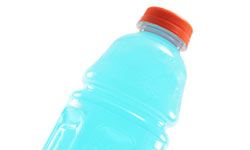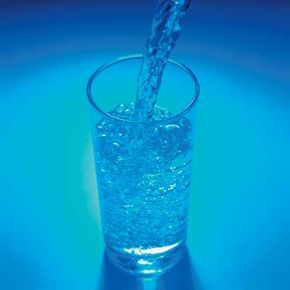If nausea and vomiting are persistent, here are several home remedies from the kitchen to put them in their place:
Home Remedies from the Refrigerator
Cranberry juice. Avoiding solid food for a day is sometimes recommended when you're nauseated and vomiting, but don't give up the fluids. Drink cranberry juice during your fast. It's generally easy on your digestive tract.
Lemon juice. Mix together 1 teaspoon honey and 1 teaspoon lemon juice. And this cure comes with a folk-ish instruction: Dip your finger into the mix and lick it off so that you take it in slowly.
Lime juice. For an immediate nausea/vomiting stopper, mix 1 cup water, 10 drops lime juice, and 1/2 teaspoon sugar. Then add 1/4 teaspoon baking soda and drink.
Milk. Don't drink it straight. Instead, try this vintage milk toast recipe for a bland food that's easy to eat when combating nausea and vomiting. Heat 1 cup milk until hot but not boiling. Put it in a bowl. Then take 1 piece of toast, slightly buttered, and crumble it into the milk. Eat slowly.
Onion. Juice an onion to make 1 teaspoon. Mix with 1 teaspoon grated ginger and take for nausea.
Home Remedies from the Spice Rack
Aniseed. This helps cure nausea and vomiting. Brew aniseed into a tea by putting 1/4 teaspoon in 1/2 cup boiling water. Steep for five minutes. Strain and drink once a day. Or sprinkle some aniseed on mild vegetables such as carrots or pumpkin. If your stomach will tolerate fruits during or just after a bout of nausea or vomiting, try aniseed on baked apples or pears.
Cinnamon. Steep 1/2 teaspoon cinnamon powder in 1 cup boiling water, strain, and sip for nausea. Do not try this remedy if you're pregnant.
Clove. This makes a nice nausea-fighting tea. Brew a cup using 1 teaspoon clove powder in a teacup full of boiling water. Strain out any clove that might be remaining, and drink as needed.
Cumin. Steep a tea with 1 teaspoon cumin seeds and a pinch of nutmeg to soothe tummy troubles.
Fennel. Crush 1 tablespoon seeds and steep for ten minutes in 1 cup boiling water. Sweeten to taste with honey. Sip as necessary for nausea.
Ginger. Without a doubt, ginger is the best stomach woe cure. Taken in any form, it will relieve nausea. Try ginger tea, gingerbread, or gingersnaps. If you're traveling, take along ginger sticks or crystallized ginger instead of travel sickness pills or patches. Studies show ginger to be more effective than the potion you purchase at the pharmacy. Skip the ginger ales, though, unless they have real ginger content. Much of today's ginger ale is absent its curative ginger.
Mint. Mint tea relieves nausea. Simply steep about 1 tablespoon dry leaves in 1 pint hot water for 30 minutes; strain and drink. Don't toss out those mint leaves when you drink the tea. Instead, eat them. Eating boiled mint leaves can cure nausea, too.
Home Remedies from the Cupboard
Vinegar. Sometimes the smell of vomit can cause additional vomiting, or continued nausea. After you vomit, rinse the remaining particles out of your mouth with 1/4 cup water and 1/4 cup vinegar in a 4-ounce glass. The stomach acids in vomit can be harsh on tooth enamel. Just rinse, don't gargle. This freshens your breath, too.
With these home remedies, you've now got some great tools to prevent and stop nausea and vomiting. Once you've got your nausea under control, you'll be able to start eating, drinking and recovering.
For more information about conditions related to nausea and vomiting, try the following links:
ABOUT THE AUTHORS:
Timothy Gower is a freelance writer and editor whose work has appeared in many publications, including Reader's Digest, Prevention, Men's Health, Better Homes and Gardens, The New York Times, and The Los Angeles Times. The author of four books, Gower is also a contributing editor for Health magazine.
Alice Lesch Kelly is a health writer based in Boston. Her work has been published in magazines such as Shape, Fit Pregnancy, Woman's Day, Reader's Digest, Eating Well, and Health. She is the co-author of three books on women's health.
Linnea Lundgren has more than 12 years experience researching, writing, and editing for newspapers and magazines. She is the author of four books, including Living Well With Allergies.
Michele Price Mann is a freelance writer who has written for such publications as Weight Watchers and Southern Living magazines. Formerly assistant health and fitness editor at Cooking Light magazine, her professional passion is learning and writing about health.
ABOUT THE CONSULTANTS:
Ivan Oransky, M.D., is the deputy editor of The Scientist. He is author or co-author of four books, including The Common Symptom Answer GuideBoston Globe, The Lancet, and USA Today. He holds appointments as a clinical assistant professor of medicine and as adjunct professor of journalism at New York University. (McGraw-Hill, 2004), and has written for publications including the
David J. Hufford, Ph.D., is university professor and chair of the Medical Humanities Department at PennsylvaniaState University's College of Medicine. He also is a professor in the departments of Neural and Behavioral Sciences and Family and Community Medicine. Dr. Hufford serves on the editorial boards of several journals, including Alternative Therapies in Health & Medicine and Explore.
This information is solely for informational purposes. IT IS NOT INTENDED TO PROVIDE MEDICAL ADVICE. Neither the Editors of Consumer Guide (R), Publications International, Ltd., the author nor publisher take responsibility for any possible consequences from any treatment, procedure, exercise, dietary modification, action or application of medication which results from reading or following the information contained in this information. The publication of this information does not constitute the practice of medicine, and this information does not replace the advice of your physician or other health care provider. Before undertaking any course of treatment, the reader must seek the advice of their physician or other health care provider.


